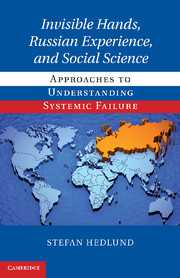 Invisible Hands, Russian Experience, and Social Science
Invisible Hands, Russian Experience, and Social Science Published online by Cambridge University Press: 01 June 2011
Ever since Adam Smith presented the world with his immortal classic The Wealth of Nations, liberal market economy has been based on the centrality of opportunity. If only markets can be sufficiently deregulated, and the state can be kept at bay, good things will follow. Entrepreneurs and consumers will seek out and act on their best available opportunities for profit and utility maximization, competition will make sure that all resources are allocated to their best uses, and welfare will be maximized.
Based on such premises, it is not surprising that over time economics has developed into a science that is fundamentally geared toward an optimistic view of market forces driven by the pursuit of self-interest. This stands in some considerable and interesting contrast to the epithet of a “dismal science” that was once ascribed to political economy by the Victorian writer Thomas Carlyle. The reason then was the dire predictions of pending population checks and food shortages that were issued by Thomas Malthus and David Ricardo. That, however, was soon to change.
Under the combined influence of rapid technological development and the neoclassical revolution in economics, a firm belief began to emerge that economic growth would quite simply take care of itself. The previous “dismal” views that had emphasized natural constraints on the market forces could thus be forgotten, and the role of liberal government could be reduced to keeping out of the way.
To save this book to your Kindle, first ensure no-reply@cambridge.org is added to your Approved Personal Document E-mail List under your Personal Document Settings on the Manage Your Content and Devices page of your Amazon account. Then enter the ‘name’ part of your Kindle email address below. Find out more about saving to your Kindle.
Note you can select to save to either the @free.kindle.com or @kindle.com variations. ‘@free.kindle.com’ emails are free but can only be saved to your device when it is connected to wi-fi. ‘@kindle.com’ emails can be delivered even when you are not connected to wi-fi, but note that service fees apply.
Find out more about the Kindle Personal Document Service.
To save content items to your account, please confirm that you agree to abide by our usage policies. If this is the first time you use this feature, you will be asked to authorise Cambridge Core to connect with your account. Find out more about saving content to Dropbox.
To save content items to your account, please confirm that you agree to abide by our usage policies. If this is the first time you use this feature, you will be asked to authorise Cambridge Core to connect with your account. Find out more about saving content to Google Drive.